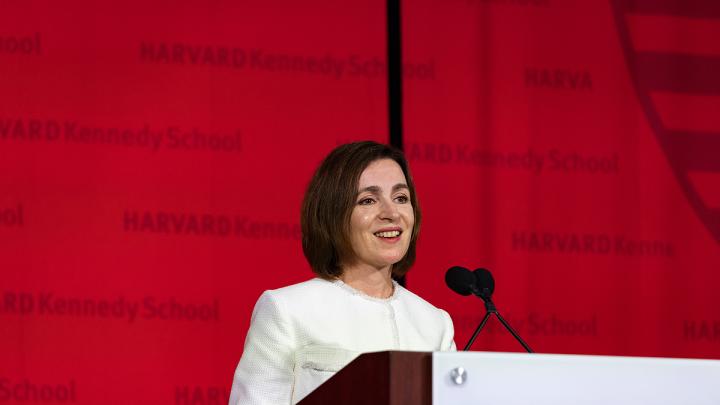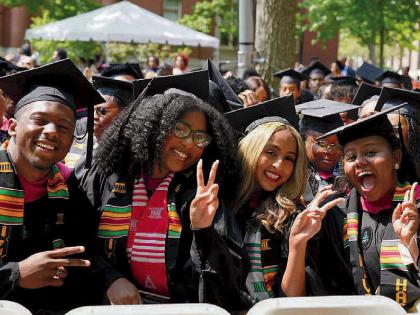The war in Ukraine loomed over the Class Day celebrations at the Harvard Kennedy School (HKS) Wednesday afternoon, with a keynote address delivered by Maia Sandu, M.C./M.P.A. ’10, president of the Republic of Moldova, a small nation that borders Ukraine to the southwest. Since Vladimir Putin’s invasion of its larger neighbor, experts have speculated that the country of four million people could also become a Russian target, and Sandu told The Economist earlier this month that this is Moldova’s most dangerous moment since gaining independence from the Soviet Union in 1992.
Introducing Sandu, HKS dean Douglas Elmendorf spoke of the upheaval her country has endured amid the fighting on its doorstep: increased security risks, economic turmoil, and a wave of desperate refugees. Almost 500,000 fleeing Ukrainians crossed into Moldova during the past three months, and about 100,000 remain there, he said—nearly all of them, Sandu added later, sheltering in the homes of Moldovan citizens. “The challenges Moldova faces today are almost unimaginable,” Elmendorf said. “And yet, President Sandu keeps going….She has demonstrated principle and effective public leadership and is a model for us all, something for us all to aspire to.”
Sandu, too, talked briefly about the war, which has stretched her country’s economic and social resources and threatened its sovereignty. “There can be no justification for Russia’s war against Ukraine, another sovereign nation, for capturing territories or carving out spheres of influence in the 21st century,” she said. In March, Moldova officially applied to become a member of European Union, and recently it was granted candidate status, an important step in the process toward membership and, Sandu said, “an anchor for our independence, peaceful development, economic and political reforms.”
But most of her address focused on her political journey of the past decade, her efforts to rid Moldova of corruption and institute a new kind of politics there. Her entry into politics was not planned, she said—she arrived at Harvard in 2009 as a mid-level civil servant and after graduation took a job as an advisor at the World Bank. An unexpected offer to become Moldova’s minister of education brought her back home, transforming her overnight into a public figure and launching what would become a grueling and ever-widening struggle to end corruption in Moldova: sharp reforms to stop a “corruption ring” in schools—“cheating at high school graduation exams was almost a national sport,” she said—grew into a national campaign to rid the country of its “authoritarian oligarchic regime.” In 2015, Sandu founded the Party of Action and Solidarity, and ran for president a year later, winning enough votes to establish her political party as a consistent force in parliament. In 2019 became prime minister on the strength of a “fragile” coalition with the pro-Russian democratic socialists. Sandu was forced out a few months later—because, she said “we refused to compromise on our values: rule of law, independent justice, good governance in the interest of our citizens, transparency”—but in 2020 won the country’s presidency with 58 percent of the vote (a landslide election the following year brought to power the current prime minister, Natalia Gavrilita, M.P.P. ’05). Along the way, the powerful establishment leveled threats and intimidation, canceled elections, and used “unabating” propaganda. “But we knew that we had to stop them before they would become too strong and drag the country into long term authoritarianism.”
Sandu offered the soon-to-be-graduates concrete insights from her experience. Recalling a moment in 2015 when she was “suddenly” offered the position of prime minister under what felt like suspicious circumstances—and by politicians whose motives she did not trust—she said, “Such moments in life make or break you. You do not get to refuse the seat of the prime minister every day, but you have to, if the interests behind it are obscure or malicious….Please remember, it takes years of hard work to build a good reputation, and only one bad decision to compromise it forever.”
She encouraged the audience to stick to their principles, to “set goals higher than yourself for your country or organization,” to be patient and bold, but also humble: “Remember that chances and circumstances play a role in our lives, no matter how good you are. The world does not, and should not, revolve around you.”
More than once, she admonished the graduating class to get involved in politics. “I never intended to become a politician. I didn’t know how to do it,” she said. “I realize that here at Harvard Kennedy School and in other good places, well-educated, effective managers and sectoral leaders say they prefer to keep their distance from politics. People do not want to mess up with politics. I thought exactly the same. Up to a point. Up until I decided that I do not want to live in a country led by corrupt people.” Avoiding politics is a mistake, she said. “You can be an outstanding leader in your organization, company, or institution; you can win small battles, enjoy victories, implement worthwhile strategies. But if you want real change that will directly impact communities and societies, you need to get into politics. Politics is about big, real, immediate, and long-term impact. Political leadership is about engaging society and setting an example and standards for the society, shaping the future. It is about empowering people.” Her own unplanned entry into politics was a “leap of faith,” she said, but looking back, a necessary one. And a leap that is necessary for others to take, too: “We need new leaders” to face great challenges.
At the end of her remarks, Sandu returned to this theme. Many people had perceived Moldova’s slide into corruption an irreversible, but it wasn’t, she said. “You may fail sometimes, but you have to stay committed….Please know that you can do amazing things, even in less-favorable environments.”
Finally, she said, “If you want to live in a better world, and I'm sure you do, I urge you to become involved in shaping it, on behalf of your own people, and for the future generations.”







